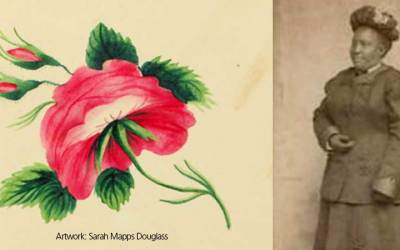
Grace Douglass
Grace Douglass Grace Bustill Douglass (1782 – March 9, 1842) was an African-American abolitionist and women’s rights advocate. Douglass was a devout Quaker, attending meetings of the Society of Friends at the predominantly white meetinghouse on Arch Street. Although she was a devout Friend, she was never allowed membership into the Society of Friends because she was black.
Grace Bustill Douglass is the great grandaunt of actor, singer, and political activist Paul Bustill Robeson. When Grace Douglass attended meeting in New York during the American Convention of Anti-Slavery Women, she was told to sit upstairs, “because Friends do not like to sit by persons of thy color.” Grace operated a school, and was a founding member of the Philadelphia Female Anti-Slavery Society.
Letter from Grace Douglass to be read at Quaker Meetings:
Philadelphia February 28, 1819
Dear Friend,
it has been said by our enemies among the Whites, that it is doing us harm to set us free. We cannot, say they, maintain ourselves decently and respectable. Some of them must manage for us. To prove which, they bid us look around and see the many poor distressed objects of our color with which the city of abounds, where we have every encouragement to do well for ourselves, overlooking the manner in which most of us have been brought up. Very many, in great families where they live on the best, dressed in the finest and most fashionable clothing. Of course they carry these customs into their own families. They work hard, therefore they have money to spend and must enjoy it in the way they have seen others do. And they are apt too, to think they have a right to do so, as they have worked for it.
When I was first married I’ve found myself precisely in this way. We had our parties and tea drinking’s; we must have the best wine and the best cake; our friends had it and we must give them the same they gave us, or be considered mean. But when it pleased the Lord to open my eyes, these things became a burden to me. I thought I would assist the poor if I had the means some people had, but I have no more than I want myself; so how can I help the poor? Then it occurred to me that Christ lived a self-denying life, and I began to think how I might deny myself, take up the cross and follow him. Now a pair of Morocco shoes cost $1.50, a pair of leather will do just as well and I shall have $.50 cents for the poor. A fine Muslim dress cost $5. I can buy a very good calico one for three and I have two dollars to spare. I reasoned in this manner till my dress was reduced the standard which you see. I wore a plain straw bonnet with a white ribbon. The ribbon often soiled and required changing. I thought if I wore a plain silk one the strings will last as long as the bonnet and here will be something saved.
These things were very trifling in themselves, but oh! the peace of mind and the Liberty I gained by it more than doubly compensated me for the mortification I first endured in seeing others who could not afford it so well, better dress then myself. I could not go to meeting let the weather by as it would, I was not afraid of spoiling my shoes or any part of my dress. I no longer felt disturbed as to whether my appearance was better than my neighbor or not, and I always had something for the poor
Now dear friend, if you’ll please, read this in one of your meetings and beg them to try my plan for year, and I think they cannot fail to be much benefited by it.
your friend Grace Douglass

Sarah Mapps Douglass
At twenty-five, Sarah Mapps Douglass organized financial support for William Lloyd Garrison’s abolitionist newspaper, The Liberator. Her painted images on her written letters may be the first or earliest surviving examples of signed paintings by an African-American woman.
Daisy Douglass Barr
Daisy Douglass Barr served as the Imperial Empress of the Queens of the Golden Mask, the women’s auxiliary of the powerful Indiana Klan. Her role in the Invisible Empire was so important that she worked directly with D.C. Stephenson to organize women’s branches.
Sojourner Truth
Sojourner Truth was born a slave named Isabella Baumfree in southeastern New York. The future abolitionist had several owners during her childhood—many of them cruel—before, at age 13, ending up the property of John Dumont. For 17 years, she worked for him and then...
Becoming






















0 Comments